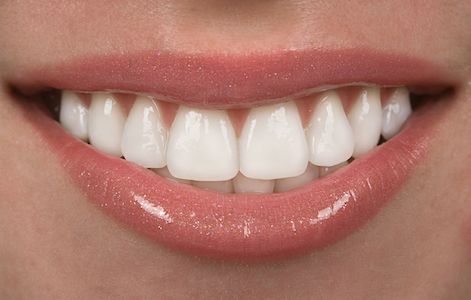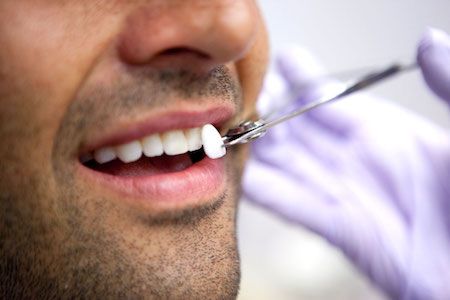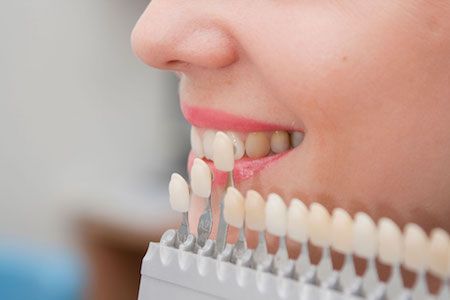
Dr. Allred of Allred Dental offers a range of cosmetic dentistry offerings at his San Diego, CA dental office. He specializes in creating both porcelain and composite veneers - and even builds trial smiles for you to "test drive" your new teeth before you commit to veneers. Call today to schedule an appointment with Dr. Allred!
And, read on to find out what dental veneers are and how they can help you out. This article also features the pros and cons of dental veneers.
What are Dental Veneers?
Dental Veneers are tooth-colored, ultra-thin shells that are attached to the frontal surface of the teeth. They are also known as dental porcelain laminates or porcelain veneers. They improve the facial appearance of a person. They are normally made from resin composite materials or porcelain. Dentists permanently attach them to the mouths of their patients.
While some people may get only a single veneer when their tooth gets chipped or broken, many patients get numerous veneers attached. This gives them a more symmetrical look with an even smile. Dental veneers get attached to your teeth and give them a classically shaped appearance.
Fitting traditional veneers need intensive preparatory work. Before fixing traditional dental veneers, the tooth structure needs to be ground down. The process is irreversible and can be painful in certain cases. Doctors generally advise local anesthesia for this. It allows the appropriate placement of the veneers.
No-prep veneers need minimum tooth preparation. In many cases, they do not even require local anesthesia. Talk to your dentist before you choose the type of dental veneer. Only a trained and experienced orthodontist will be able to give you the best advice regarding the kind of veneers you require.
What are the pros of dental veneers?
Repair teeth easily
If you want to fix all your serious dental problems, then porcelain veneers can do that easily for you. Dental veneers are thin pieces of porcelain that can repair your teeth and make your smile more attractive and beautiful. Dental veneers are custom-made for every single patient. Thus, they give a unique and personalized fit for each patient. Veneers are an excellent choice if you are facing major cosmetic issues with your teeth.
Give a natural appearance
Dental veneers are great to have because they look extremely natural. Orthodontists make sure that the dental veneers match the color of tooth enamel. Special care is also taken to ensure that the veneers fit perfectly with the natural contours of your teeth. Dentists place the veneers so accurately that they give a natural-looking smile to the patients. The veneers are uniquely designed to give a customized fit.
Less invasive procedure
Dental veneers involve a minimally invasive procedure. If you go through other dental restoration processes, you will find out that they are more invasive. In this process, at first, dentists remove a small part of the frontal surface of the targeted teeth. After shaving down the teeth, each veneer is placed using dental cement. When dentists fit the dental veneers, patients require little or in some cases, no anesthesia.
Permanent and durable
Among the many pros and cons of dental veneers, the best thing about porcelain veneers is that they are permanent. Porcelain veneers resist tooth decay and also prevent your teeth from getting stained. Veneers can also help you get rid of dental cavities since they are non-porous, unlike the natural, porous tooth enamel. If you maintain your dental veneers properly, it can last for around 12 to 15 years.
Low maintenance
While most orthodontic treatments involve expensive and time-consuming maintenance, dental veneers are notable for their low maintenance. They are also very popular for this reason. You can maintain the dental veneers just as you care for your natural teeth. Simply brush them twice a day and floss once daily. Also, remember to visit your dentist for regular check-ups. Thus, you see that it is very easy to maintain them and their regular maintenance does not involve much of an expense.
What are the cons of dental veneers?
Price
When compared to other dental restoration operations, veneers might seem to be a bit expensive. Veneers tend to be costlier because of the materials that they are made up of. The total cost depends on the number of teeth that requires to be treated. The price of dental veneers also depends on the kind of veneers chosen. Since veneers are cosmetic, they are not generally covered by medical insurances. However, it is still better to get it confirmed by your insurance provider.
Increased sensitivity
During the process, some teeth enamel is removed to create ample space for the veneers to be fitted into. Some patients might experience increased tooth sensitivity after getting dental veneers. Normally, this sensitivity continues for a few days, and then it starts fading away slowly. This problem is temporary and occurs only when you are eating or drinking something very hot or cold. Tooth sensitivity is inconvenient and uncomfortable. However, it can be treated with the right products.
An irreversible process
Your dentist needs to alter the natural structure of your teeth to get the veneers placed properly. For this, a part of the tooth's enamel needs to be removed. After the process is completed, there is no way to restore the teeth enamel that has been shaved down. On getting the dental veneers fitted, your tooth structure would never remain the same. If you want to use veneers only to improve your natural smile, you should rethink the natural loss and make your final decision.
Not removable
While some other orthodontic materials allow you to remove them while having food, dental veneers can never be removed. Among the many pros and cons of dental veneers, this is perhaps the most important. Since veneers are a permanent solution to your dental issues, you can never get them removed even if you want. If you need to remove them under any circumstance, then there is only one way. You have to get the veneer completely broken by a trained and experienced medical practitioner.
Delicate and prone to damage
Normally, dental veneers last for around 10 to 15 years. If you take care of your veneers regularly and properly, then there are fewer chances of damages occurring. However, after some time, they start getting stained and tend to chip off. For this reason, they also need to get replaced. If you are someone who has the habit of grinding the teeth and eating crunchy or hard food items, then this treatment might not be the best option for you.
What conditions do dental veneers help mask?
When you have known about the pros and cons of dental veneers, it is time that you understand when to go for them. The following are the ideal situations when you should consult a dentist and have dental veneers attached to your natural teeth:
Discoloration of teeth
Your teeth may tend to lose their original color as a result of consuming highly-pigmented food or drinks over a long time. Even if you get your stained enamel bleached by a dentist, they might also get stained again. If you wish to get whiter teeth and want to make your smile attractive, then dental veneers are a good solution. Since veneers are stain-resistant, you do not need to worry about them getting discolored.
Crucial cosmetic issues
Veneers can help you rectify cosmetic dental issues like chips, cracks, or minor misalignment. They are attached to the front part of your teeth. Therefore, the position of your teeth does not get changed. They hide all the minor orthodontic issues that you might suffer from.
Damaged tooth enamel
Your teeth enamel is strong but it is not indestructible. The enamel can get damaged if you brush too harshly or eat highly acidic food. Damaged enamel becomes a serious concern since it does not grow back. However, they can be replaced by dental veneers. Veneers are good for teeth with enamel erosion and enamel abrasion. They also look very beautiful.
Gaps between teeth
Though veneers cannot alter the position of the teeth, they can fix problems like gaps between your teeth. Orthodontic treatments, other than veneers, can also correct small gaps between teeth. However, in that case, the process continues for a long time. Instead of those, you can choose dental veneers to fill the gaps between your teeth. Veneers are an easy solution and the entire process also gets completed within a few hours only.
Now that you know a lot about the pros and cons of dental veneers, you can decide for yourself whether or not to go for it. However, be very careful after you get the dental veneers fixed to your teeth. Follow the guidelines that your orthodontics might suggest. Avoid chewing hard objects and biting fingernails. Take care of your teeth and gums. Brush and floss regularly. If your bite feels uncomfortable after the veneer placement, consult your orthodontist and seek immediate medical attention.
Renew Your Smile With Dental Veneers
Now that you know all about the basics of dental veneers, it's time to schedule your consultation with Dr. Allred. Call today! Se habla Español!


